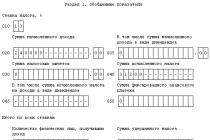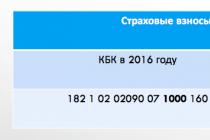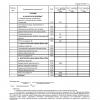Credit– transfer for temporary use of any valuables (in any form) from one owner to another on the terms of return, urgency and payment. Modern relations in the field of lending are expressed in various forms and types of such a financial product. Depending on this, the rules for its provision also differ.

Lending principles. General conditions for granting a loan
The conditions for granting any loan are based on its principles:
- returnability;
- urgency;
- payment.
Repayment is understood as the need for mandatory reversion of the material value received by the borrower to the lender. Urgency is a natural form of return assurance. It assumes that the funds received on loan are not only subject to return, but must be repaid within a strictly defined period.
The last condition of the loan is the payment of the loan. This principle determines the obligatory remuneration of the creditor for the use of his material value. It is expressed in the form of either a lump-sum payment or payment in installments during the entire term of the agreement.
Relations between the subjects of lending are documented in the form of a concluded loan agreement. Integral parts of this document are its general and individual conditions .
General terms credit agreement are established by the creditor independently, unilaterally. They are developed in accordance with the requirements of the current legislation. The rules of the accession agreement are applicable to them (Article 428 of the Civil Code of the Russian Federation). That is, it is considered that the borrower's consent to such conditions is confirmed by the conclusion of the main loan agreement. In this case, the signature of the borrower is not required.
The general conditions developed by various financial and credit organizations / banks do not differ significantly from each other. As a rule, they include the following main positions (sections):

The general parameters that determine the conditions for providing a loan product are those established by the lender:
- product targeting;
- requirements for the consumer;
- minimum/maximum amount and currency of the loan;
- loan term;
- form of granting credit funds (cash / non-cash);
- interest for use;
- ensuring the fulfillment of consumer obligations (insurance, guarantee, pledge).
The General Conditions may include additional attachments. They relate to a specific type of loan product or program implemented by the lender institution.
Amendments and additions to the current document are also accepted by the creditor independently (without agreement with the other party). Such decisions are brought to the attention of borrowers through their public offering.
The developed and approved general conditions must be available at the office of the lending organization. In addition, if the lender has its own Internet resource, this document is subject to publication on the company's website. If the consumer wishes, the document can be provided to him on paper.
Having made a positive decision on lending, the lender gives the consumer a document with the individual parameters of the product for review. Unlike the general conditions, this document contains positions established by a written agreement between the consumer (borrower) and the lender institution.
The consumer expresses his consent to receive a loan under such conditions by signing it. From this moment, the main loan agreement is considered concluded.
Individual conditions, as a document, are already specifically established and prescribed:
- the shape and type of the product;
- the amount of the loan (limit, currency);
- term of the agreement (loan repayment);
- interest for use;
- repayment procedure (size, frequency, terms, methods, etc.);
- the size of the penalty/forfeit/fine;
- additional paid services creditor (list, price, procedure for rendering);
- ways of exchanging information between the parties;
- other mandatory conditions, which are determined depending on the type of a particular loan product.

Main types and forms of credit. Conditions for granting a consumer loan
| TERMS/ PRODUCT |
"EDUCATIONAL" | «WITH STATE SUPPORT» |
| Requirements for the consumer |
|
|
| Amount, currency and form |
|
|
| Term | no more than 11 years old | the term of study, increased by 10 years, allotted for repayment |
| Interest rate | 12% | 7,06% *
(at the refinancing rate of the Central Bank of the Russian Federation of 8.25%) * when changing the refinancing rate, it is calculated based on ¼ of the refinancing rate + five points |
| Security |
|
not required |
| Special conditions |
|
for consumers under 18 years of age, the product is provided only with:
Persons under guardianship are not provided with the product (Article 19 of the Federal Law "On guardianship and guardianship") |
Specific conditions for the provision are set for each consumer individually, depending on his needs and solvency indicators.
Also, for example, you can consider the conditions for the provision of products offered by such institutions as Rossinterbank, Rosselkhozbank, Ruskobank.
Mortgage loan: terms and conditions

Mortgage loan - provision of borrowed funds to the consumer on the security (mortgage) real estate. As a rule, it is issued in significant amounts and on long term.
This type of loan can be used financial institutions both for the acquisition by the borrower of the property itself (which subsequently acts as collateral), and for other types of credit products (as collateral).
In most cases, the purpose of mortgage lending to consumers is the acquisition of residential property (under construction, in the primary or secondary market).
The main parameters of the conditions for granting a mortgage:
- currency, amount and term of the loan;
- the size of the down payment;
- type and amount of interest rate (fixed/variable);
- additional commissions and payments;
- property/consumer insurance (mandatory or voluntary);
- requirements for the consumer and the necessary documents;
- amount and type of payments (differentiated / annuity), etc.
You can compare the basic conditions for providing mortgage loans using the example of products offered by the country's leading institutions. The table shows current offers* in three main areas of mortgage lending.
| TERMS/ INSTITUTION |
 |
 |
 |
| Product Purpose | acquisition of residential property (primary market) |
acquisition of residential property (secondary market) |
|
| Requirements for the consumer |
|
|
|
| Currency | Russian rubles | Russian rubles | Russian rubles |
| Interest rates | 15,00%-15,50% | 15,95% (when applying comprehensive insurance) |
17,50%-19,50% |
| Sum | from 45 thousand rubles up to 15 million rubles |
from 1.5 million rubles up to 15 million rubles |
from 300 thousand rubles up to 30 million rubles |
| Term | up to 30 years | up to 30 years | up to 15 years |
| Submission Form | lump sum/partial | one-time, on account |
|
| Down payment / security deposit | from 20% of the value of the acquired property | min. security deposit 30% |
|
| Security |
|
|
|
| Insurance | compulsory insurance of risks of loss/damage of collateral for the entire period (except for the land plot) | Compulsory insurance of risks of loss/damage of collateral for the entire period | compulsory risk insurance:
|
| Payment order | monthly annuity payments | annuity / differentiated payments | |
| Consumer responsibility | penalty 20% per annum | penalty 0.1% per day | penalty 0.05% per day |
| Consideration of an application for funds | 2- 5 days |
14 days |
1-10 days |
* as of the end of May 2015.
Mortgage group loans can be provided by institutions in their branches (branches) at the place of:
- registration of the consumer (or one of the co-borrowers);
- actual location of collateral;
- accreditation of the employer of the consumer (or co-borrower).
A commercial loan is a non-bank loan provided on the condition of an advance payment, prepayment, installment plan or deferred payment for goods (services/works). This form is widely used in relationships both between business entities (legal entities, individual entrepreneurs) and individuals.
At its core, it is a stipulated condition for mutual settlements between the parties to economic and legal relations. From this we can conclude that its application is feasible only within the framework of the execution of the main agreement (contract of sale, services, supply, work, etc.).
At the legislative level, there is no specification regarding the conditions in its provision. They are subject to the rules and regulations applicable to loans and credit. The parties to the relationship can independently agree and set conditions in relation to:
- Forms (advance payment, prepayment, deferment, installment plan).
- Amounts and terms.
- The amount of the fee (percentage), etc.
As a rule, in practice, the conditions for granting commercial lending spelled out in the main agreement. However, they can be formulated and formalized in a separate document (additional agreement). In this case, the same form requirements apply to it as to the main document.
Accordingly, if the main agreement is subject to requirements for its written form or state registration, then similar requirements should be applied to the loan agreement.
This form of lending allows consumers to borrow specific things. The object can only be material products (raw materials, materials, other goods) provided for paid fixed-term use to the consumer.
After the expiration of the period established by the agreement, such things (of identical quality and type) are subject to return to the creditor with payment of interest for their use.
Relations between business entities are based on written agreements - contracts commodity credit. The document establishes and defines the conditions for its provision. Significant of them are:
- Specification of the thing transferred on credit (quantity, assortment, completeness, quality, etc.).
- The amount (rate) and the procedure for making payments for the use.
- Conditions for the return of a thing or compensation expressed in terms of monetary form for its use.
Establishing a return period is not a mandatory and essential condition. According to the norms of the current legislation, in case of its absence, the loan is subject to return after a month after the presentation of the creditor's claim to the borrower.
Unless otherwise provided in the agreement itself, the relations arising in connection with the use of a commodity credit are compensatory. The amount of interest (fee) for the use of goods and the procedure for making payments are determined independently by the parties to the agreement. If this condition is not specified, then the interest rate is determined as equal to the refinancing rate of the Central Bank of the Russian Federation.
A budget loan is a targeted reimbursable loan at the expense of the budget. It is one of the forms of financing its expenses. Borrowers can be both state and municipal organizations, and legal entities(not related to the specified categories). The main requirement for recipients is the absence of debts on mandatory payments to the relevant budget.
The current legislation for municipal and state enterprises provides for the possibility of obtaining interest-free loan. Other organizations may be granted a loan only on the terms of payment of interest for its use. Their rate is determined in the relevant agreement, and in the amount of at least 1/10 of the Central Bank refinancing rate (valid during the term of the loan).
A company can get a loan if the following conditions are met:
- the legal entity is not in the process of its reorganization, liquidation or bankruptcy;
- the company is properly registered and operates on the territory of the municipality (the budget of which is crediting);
- there are no debts on previously received budget money, mandatory payments of all levels and extra-budgetary state funds.
In addition, a prerequisite for granting a loan to a legal entity is confirmation of its financial stability. For this purpose, the financial control body conducts a preliminary financial audit of the state of the organization.
A loan is issued to private companies only if they provide liquid collateral. Its ways can be:
- Bank guarantee.
- Guarantee.
- Property collateral (including in the form of securities, shares, units, etc.) covering 100% of the loan.
- When choosing a loan product and its program, be sure to study the general lending conditions approved by the financial institution.
- Be aware that a banking institution is obliged to conduct a full consultation of the borrower on the terms of the loan. If the consumer wishes, the lender must also provide free of charge for review all the documentation (general and individual conditions) for a particular product.
- Before signing a loan agreement, carefully study all its conditions. If some positions are not clear, you should ask an employee of the creditor bank to clarify them.
- The lender is obliged to provide the consumer with a credit agreement (individual conditions) for review. Be aware that the period for familiarization with its terms cannot be less than 5 days.
General Conditions for Granting, Servicing and Repaying Home Loans(hereinafter referred to as the General Credit Conditions)
1. Terms and definitions used in the General Credit Conditions
Annuity payments – sums of money, sent on a monthly basis to repay the received Loan and pay Interest for the use of the Loan, equal to each other during the entire loan period or each of the time intervals into which the total loan period is divided.
The amount of the final payment (including within each of the time intervals) is corrective and may differ from the amount of all previous payments up or down. The payment amount as of the last Payment Date is determined as the balance of the Loan Indebtedness and accrued Interest for the use of the Loan as of the specified date (inclusive).
Bank (Lender; according to the text of the Agreement - Lender)– open joint-stock company"Sberbank of Russia", general license No. 1481 dated 08/08/2012, location: Russia, 117997, Moscow, Vavilov street, 19.
Payment schedule - a document containing information on the Payment dates and amounts in respect of repayment of the Loan Debt and payment of Interest for the use of the Loan.
Includes time intervals for repayment of the Loan and payment of Interest for the use of the Loan, into which the total loan term is divided, including, but not limited to: before the Borrower/Co-Borrower(s) reaches retirement age and after the Borrower/Co-Borrower(s) reaches retirement age .
Treaty - loan agreement(in case of a one-time issuance of the Credit) / agreement on the opening of a non-renewable credit line(when issuing a Loan in installments), concluded between the Borrower/Co-Borrowers and the Lender, according to which the Lender provides funds to the Borrower/Co-Borrowers in the amount and on the terms stipulated by the Agreement, while the General Loan Terms are integral part Agreement.
The contract is the basis- an agreement accepted by the Lender from the Borrower/Co-Borrowers and specified in the Agreement, in accordance with which the acquisition / investment of construction / individual construction/acquisition and investment of construction/acquisition and individual construction of a Real Estate Object.
Debt under the Agreement– includes Urgent and Overdue Loan Indebtedness, Urgent and Overdue Interest for the use of the Loan, as well as Penalty. Wherein:
- Term debt under the Agreement– the balance of the Loan amount and Interest for the use of the Loan, the maturity and payment of which in accordance with the terms of the Agreement has not yet come,
- Overdue debt under the Agreement– the balance of the Loan amount and Interest for the use of the Loan, for which the Borrower/Co-Borrowers have not fulfilled the terms of the Agreement in terms of timely repayment and payment within the terms established by the Agreement.
Loan debt– the balance of the Loan amount to be repaid to the Lender. Includes:
- Term loan debt– the balance of the Loan amount to be repaid to the Lender, the maturity of which, in accordance with the terms of the Agreement, has not come,
- Overdue loan debt– the balance of the Credit amount to be repaid to the Lender, the maturity of which has come, not repaid within the terms established by the Agreement.
Borrower/Co-borrower(s) – depending on the context of the General Credit Conditions, a natural person(s) who proposes to the Lender to conclude an Agreement or has entered into an Agreement with the Lender.
Protected loan– a lending condition stipulated by the Agreement based on the application of the Borrower/Title Co-borrower and involving the provision of a Loan at a reduced interest rate subject to life and health insurance of the Borrower/Title Co-Borrower in favor of the Lender for the entire loan term. Insurance conditions are determined by the insurance rules of the selected insurance company.
Other account(s) – account(s) for the deposit(s), the conditions of which(s) allow you to make income and expenditure transactions, account(s) of the debit bank(s) card(s), current account(s) of the Borrower/Title Co-borrower opened in the Loan currency with the Lender in case of closing the Account(s)/changing the list Accounts (subject to clause 3.5.1. of the General Credit Terms) from which the Credit is repaid.
Credit- funds provided by the Lender to the Borrower/Co-Borrowers in the amount and on the terms (including payment, urgency, repayment) stipulated by the Agreement.
Young family- a family in which at least one of the spouses has not reached the age of 35 or an incomplete family (a family with one parent and a child / children), in which the parent has not reached the age of 35, on the date of submission of the application form to the Creditor for getting a loan.
Penalty - the amount of money that the Borrower/Co-Borrowers are obliged to pay to the Lender in the cases provided for by the Agreement.
Payment date– the calendar day established for the monthly repayment of the Loan by Annuity payments, corresponding to the day of the actual provision of the Loan / the first part of the Loan.
Full cost of the loan- expressed as a percentage of the annual costs of the Borrower / Co-Borrowers for obtaining and servicing the Loan, calculated in accordance with the requirements of the law.
Order - order from the Borrower/Title Co-borrower to the Lender on the Account(s)/Other Account(s) for transfer Money in repayment of the Debt under the Agreement, as well as for early repayment loan or part thereof.
Interest for the use of the loan 1 - interest accrued by the Creditor on the Loan Debt, in the amount, in the manner and within the time limits, stipulated by the Treaty. Include:
- term interest for the use of credit– interest for the use of the Loan, the payment term of which, in accordance with the terms of the Agreement, has not yet come, including the interest for the use of the Loan accrued on the Term Indebtedness under the Loan, and the interest for the use of the Loan accrued on the Overdue Debt under the Loan,
- Overdue interest for the use of the Loan– interest for the use of the Credit, the due date for which has come, not paid within the terms established by the Agreement.
Account(s) - account(s) on the deposit(s), the conditions of which(s) allow you to make income and expenditure transactions, account(s) of debit(s) bank(s) card(s), current account(s) of the Borrower/Title co-borrower opened(s) in the Loan currency with the Lender from which the Loan is repaid. The account may be a Credit Account.
Credit account - current account of the Borrower/Title Co-Borrower opened in the Loan currency with the Lender to which the Loan is credited. The Loan Account number is specified in the Agreement.
Title co-borrower - The Co-Borrower who registers the Real Estate Object in his (common) ownership and performs on behalf of the Co-Borrowers, as well as in the interests of the Co-Borrowers, with their common consent, the obligations and actions provided for in paragraphs. 2.1., 2.2.2., 2.5., 3.5.1., 3.9.1., 4.1.1., 4.3.8. (reference to clause 4.3.8. applies if the provided Credit meets the conditions specified in this clause), 4.4.12. of the General Lending Conditions, as well as other actions providing for the provision of an order (s), application (s) and other documents to the Lender in accordance with the Agreement. FULL NAME. The title co-borrower is indicated in the Agreement.
2. OrderprovidingCredit
2.1. The date of actual granting of the Loan is the date of crediting the Loan/the first installment of the Loan to the Loan Account. The loan can be provided in one of the two following ways (the method of issuing the loan depends on the terms of the loan product provided and is determined by the Agreement):
Lump sum at the request of the Borrower/Title Co-Borrower by crediting to the Loan Account (when granting a Loan for investing in construction, if the Basis Agreement provides for a one-time payment of the cost of the Real Estate Object, as well as for the acquisition of the Real Estate Object);
In installments at the request of the Borrower/Title Co-Borrower by crediting to the Credit Account within the limits of the unused (free) balance of a non-revolving credit line (when providing a Loan for investing in construction, if the Basis Agreement provides for payment of the cost of 2 Real Estate Objects in installments, as well as for individual construction of a Real Estate Object) , wherein:
for individual construction of the Real Estate Object, carried out on the basis of an agreement with a construction organization or with another person carrying out construction - the amount of the first part of the Credit should not exceed estimated cost construction of the Real Estate Object/cost of works on the construction of the Real Estate Object (excluding the cost of finishing/finishing works on the Real Estate Object);
for the individual construction of the Real Estate Object, carried out independently without the involvement of construction organization or another person carrying out construction - the amount of the first part of the Credit must not exceed simultaneously:
50% of the established credit line limit;
the estimated cost of construction of the Real Estate Object / the cost of construction work on the Real Estate Object (excluding the cost of finishing / finishing work on the Real Estate Object);
for loans for individual construction with the simultaneous acquisition of a land plot, payment for the cost of its acquisition is included in the amount of the first part of the Credit.
2.1.1. if it is necessary to issue collateral before issuing the Loan/the first installment of the Loan:
Proper execution of security for the fulfillment of obligations under the Agreement, including:
2.1.1.1. when registering a pledge of rights of claim of a participant shared construction:
Provision of the Contract concluded (registered) in accordance with the procedure established by the current legislation for investing in the construction of a real estate object (contract for participation in the shared construction of a Real Estate Object or an agreement for the assignment of the right to claim under an agreement for participation in shared construction of a Real Estate Object), as well as:
when registering a pledge of the rights of claim of a participant in shared construction by virtue of an agreement:
Providing a document confirming the transfer to state registration agreements on pledge of rights of claim of a participant in shared construction under an agreement on participation in shared construction of a Real Estate Object;
when registering a pledge of the rights of claim of a participant in shared construction by virtue of law The contract-ground for investing in the construction of a real estate object must contain a note on the pledge of the rights of claim of a participant in shared construction in favor of the Lender, and in the absence of such a mark, an extract from the Unified state register rights to real estate and transactions with it, confirming the state registration of the pledge of the rights of claim of a participant in shared construction in favor of the Lender;
2.1.1.2. when pledging a real estate object (except for a land plot), as well as when providing a Loan for the purpose of acquiring a Real Estate Object using the Lender's individual safes for settlements under purchase and sale transactions:
Provision (ensuring provision) by the Borrower/Co-Borrowers to the Lender of an insurance policy/contract of insurance for the subject(s) of collateral - the real estate object(s) specified in the Agreement, of a tripartite agreement on the procedure for working with insurance compensation (hereinafter referred to as the Tripartite Agreement) concluded between the insurance company, the Creditor and the mortgagor(s), and a document confirming the fact of full payment of the insurance premium to the insurance company for the entire period of insurance;
2.1.2. if, before the conclusion of the Agreement, a draft Basis Agreement was provided as part of the documents on the Real Estate Object: provision of the Basis Agreement signed by the parties on the conditions corresponding to those set forth in the draft Basis Agreement;
2.1.3. when providing a Loan for the purpose of acquiring a Real Estate Object using the Lender's individual safes for settlements under purchase and sale transactions:
Providing the Lender with a signed contract for the sale of the Property;
Registration with the Lender of other documents regulating the procedure for using the individual safe(s) in accordance with the Agreement;
2.1.4. confirmation of the fact of payment by the Borrower/Co-Borrowers of a part of the cost of the Real Estate Object and/or the availability of funds (in the currency of the Loan or other currency at the rate of the Bank of Russia on the date of issuance of the Loan/the first installment of the Loan) in the amount of at least the difference between the value of the Real Estate Object and the amount of the Credit by providing the Lender (one or more of the following options):
1) statements on the balance of funds on the account (deposit) opened with the Creditor;
2) payment or other documents confirming the fact of payment of a part of the cost of the Property;
3) a document(s) confirming the right of the Borrower/Title Co-Borrower and any of the Co-Borrowers (if necessary) and/or persons in whose ownership the Real Estate Object is registered in accordance with the Agreement to receive funds allocated from the budget for payment of a part of the cost of the Real Estate Object (certificate of the right to receive a subsidy, state housing certificate, etc.);
4) a document confirming the value of the property owned by the Borrower / any of the Co-Borrowers and / or his (her) spouse (s) and / or members of his / her / their family (children, parents), and sold simultaneously within the framework of completed transactions for its sale and acquisition of the credited Real Estate Object;
2.1.5. with a predicted decrease in the income of the Borrower/Co-Borrower(s) upon entry into retirement age during the term of the Agreement:
Execution of the Payment Schedule;
2.1.6. if available in the concluded Agreement - on the basis of the possibility of paying the cost of the Real Estate Object by bank transfer (except for the provision of a Credit for the purpose of acquiring the Real Estate Object using the Lender's individual safes for settlements under purchase and sale transactions) :
Execution by the Borrower/Title Co-Borrower of an instruction to the Lender to transfer the amount of the Loan/the first installment of the Loan and own funds Borrower/Co-borrowers in the amount determined in accordance with clause 2.1.4. General terms and conditions of lending (if it is necessary to transfer the Borrower's/Co-Borrowers' own funds simultaneously with the loan funds) according to the details specified in the Agreement;
2.1.7. execution of the Order;
2.1.8. When registering a pledge of the real estate object(s) prior to the issuance of the Loan (with the exception of registration of a subsequent pledge of the Real Estate Object): drawing up, with the participation of the Lender, a properly executed mortgage (in the case of a mortgage);
2.1.9. registration in the presence of the Lender's employee by individuals selling the Real Estate Object or assigning rights under the transaction, depending on their marital status, a statement that they were not married at the time of acquiring the relevant right (or providing the Lender with a notarized application) and ( or) providing a notarized consent of the spouse (a) to the alienation of the Real Estate Object / to the assignment of the right;
2.1.10. when providing a Loan for the purpose of acquiring a Real Estate Object using the Lender's individual safes for settlements under purchase and sale transactions: execution of an agreement (s) for renting an individual safe (s) and an act (s) of acceptance and transfer for use of an individual safe with the Lender ;
Among the various banking services lending remains in demand. Loans are issued in various banks. Only in each organization these services can be provided based on different requirements. The conditions for obtaining a loan differ depending on the type of loan. More about this will be discussed in the article.
Lending principles
The terms of the loan are based on the following principles:
- returnability;
- urgency;
- payment.
Repayment refers to the obligatory payment of a debt to a creditor. Urgency is considered a natural form of return assurance. This indicates that the money received must not only be returned, but also done on time. Interest is charged for the use of funds, which confirms the paid service.
The relationship between the parties is fixed in the contract. There may be general and individual conditions. The first are approved by the creditor independently on the basis of modern legislation. These include the rules of the accession agreement (Article 428 of the Civil Code of the Russian Federation). The consent of the client is confirmed by the conclusion of the contract. Individual conditions are provided to each borrower separately.
General terms
Each bank approves them, but they do not differ much. They usually include the following sections:
- definition of concepts;
- terms of issue, return, use;
- a responsibility;
- dispute resolution.

The general parameters that establish the conditions for granting a loan include:
- product targeting;
- requirements for borrowers;
- minimum and maximum by amount, currency;
- loan terms;
- form of payment of funds;
- interest for use;
- execution of obligations.
In general terms, there may be additional applications. They refer to a specific type of loan product. The lender can make changes himself. Borrowers learn about them through public offerings. The general terms and conditions for granting a loan must be available at the institution's office. If the bank has a website, then this information is necessarily published there. They can be provided to customers in paper form.
Individual conditions
If the decision is positive, the lender invites the borrower to study the individual conditions for providing consumer credit or other type of loan. The consent of the client is expressed by signing the contract. Then the document is concluded.
The individual conditions for granting bank loans are as follows:
- form and type of lending;
- amount, currency;
- duration of the agreement;
- interest;
- payment order;
- the size of the penalty;
- paid services;
- ways to exchange information;
- other conditions.
Customer credit
A consumer loan involves obtaining funds for various needs. The consumer may be individual. The norms for the provision of such services are fixed in the legislation. Implementation must be carried out by fulfilling the conditions of provision: general and individual. General conditions for granting a loan are created by the lender for multiple use. Differences for them in credit institutions no.

Consumer loans are issued under the following conditions:
- age 21-70 years;
- work experience in the last place - from 6 months;
- citizenship of the Russian Federation;
- positive credit history;
- form of funds - one-time;
- collateral is not required;
- currency - rubles;
- usually issued up to 500 thousand rubles;
- term - up to 5 years;
- rate 18-30%;
- repayment by annuity payments;
- the possibility of early repayment;
- the application is considered during the day.
The conditions for granting a loan by banks may vary. They must be in the contract. Additions may be made at the request of the parties.
Education loan
Loans for education. The main feature of the product is focus: payment for training. This sets the rules for its provision. The main requirements include:
- the age of the recipient is over 14 years old, with citizenship and registration;
- submission of a contract for paid services;
- presentation of a certificate of successful training.
Some organizations have additional requirements. For example, Rosselkhozbank and Sberbank require collateral in the form of:
- guarantees;
- pledge of property.
Sberbank requires collateral insurance. Financial institutions offer their products, which are divided into 2 types:
- loans for education in an institution with a license;
- loans for studying at a university that is on a limited list.
Therefore, the procedure and conditions for granting a loan may differ. For example, for educational loan with state support, it is necessary to study in an institution that is a participant in the experiment of the state program. The list of institutions is established by the Ministry of Education and Science every year. The educational institution must also conclude an agreement with the creditor.
Sberbank offers the following programs:
- "Educational". Issued for training persons from 14 years of age. You must have citizenship and registration. Maximum amount determined by solvency. The deadline is 11 years. The rate is 12%. A loan is issued against a guarantee.
- "With government support." The maximum amount depends on the tuition fee. Funds are transferred to the account of the educational institution. The rate is 7.06%. Security is not required. Consumers under 18 are issued with parental consent.
The conditions for repayment and granting a loan in each bank are set for each client individually, taking into account his needs and solvency.
Mortgage
Mortgage loans are secured by real estate. It is usually provided in large sizes and for a long period. This loan option is used financial institution for the purchase of property by the borrower, as well as for other types of loan products. Housing under construction is now in demand and finished objects primary, secondary market.

The main nuances of the conditions for obtaining a mortgage:
- currency, amount, term;
- the amount of the first payment;
- bid;
- additional charges;
- insurance;
- document requirements;
- payment type.
The conditions for granting a loan at Sberbank are as follows:
- primary housing;
- citizenship;
- age - 21-75 years;
- experience - from 6 months;
- currency - rubles;
- rate - 15-15.5%;
- amount - 45 thousand - 15 million rubles;
- term - up to 30 years.
Loans are repaid in a lump sum. The first payment is from 20% of the price of housing. Loan housing is provided as collateral. It is necessary to take out risk insurance for the entire period. The loan will need to be repaid in monthly installments. The penalty is 20% per annum. The application is considered 2-5 days. Mortgage is issued in the offices at the place of registration, location of the pledge or accreditation of the consumer.
What is required to get a loan?
In the past, you had to go to the bank to get a loan. Now you can apply online. To apply for a loan, you usually need to submit the following documents:
- The passport.
- Income statement.
- Bail papers.
- A copy of the work book.

Depending on the type of lending, the list of documents may vary. Before applying, you should study the conditions for obtaining loans on the site, and then decide on the design of a specific program. To sign the contract, you will have to visit the bank.
Late fees
The condition of any agreement is the fulfillment of obligations to pay the debt. Borrowers must pay the funds within the set period specified in the agreement. If you do not make payments on time, you will have to pay forfeits, penalties and fines.
The amount of compensation can be in the range of 0.5-2% of the amount for each day of delay. This amount will be added to the main payment. And timely payment will help to form a positive credit history.
Rates
Interest rates vary from bank to bank. They also depend on the type of loan. For consumer loans, they are set within 15-30%, and for mortgages - 10-15%. On the credit cards high interest rates.

For regular customers, lower rates apply. This is due to the trust in the client due to the excellent credit history which affects the approval of applications.
Commissions
Borrowers should familiarize themselves with the terms of the loan before signing the agreement. Some banks may charge fees for servicing the loan, its issuance. If it is, then its size should be indicated.
Insurance
In the credit sector, insurance is in demand. This service allows you to protect yourself from various risks. There are many types of insurance, but you need them to achieve common purpose. When registering the service in case of non-fulfillment of obligations, the debt will be paid by the insurance company.

It turns out that insurance is needed to ensure the interests of the bank? Not quite so, since the client is also interested in the return of money. Insurance will allow you to pay off the debt thanks to insurance payments.
It is customary to distinguish the following types of insurance:
- in case of death or disability;
- job loss.
Many borrowers do not want to draw up a contract. This increases the amount of debt and monthly payments. Insurance can be compulsory and voluntary. The first type of service is approved at the federal level. BUT voluntary insurance can only be recommended, but the rejection of it cannot lead to adverse consequences. Applications may not be approved if insurance is denied. Or not offered at all profitable terms. Insurance is mandatory when obtaining a mortgage and with a car loan.
Borrowers need to carefully choose a program by examining the conditions. It should be borne in mind that the bank must necessarily consult about the terms of the loan. If the consumer requires the submission of documentation, then employees must do so. All unclear details should be discussed immediately. The lender must present the contract to the client for review, which takes at least 5 days. Only if the conditions are clear should a contract be concluded.














